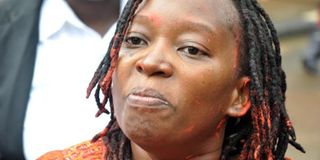Dr Nyanzi case: Insanity not a declaration; it’s a diagnosis

Dr Stella Nyanzi
On July 21, Makerere University researcher Dr Stella Nyanzi was back to Chief Magistrate’s Court, only for the State to object to her trial on charges of cybercrime and offensive communication.
The State prosecutor insisted that it would be unfair to try someone who could be of “unsound” mind stating: “It would be an abuse of the law by the prosecution to try a person who could be found to be of unsound mind,” (Saturday Vision, July 22, 2017).
This is a noble notion from the State prosecutor. I am no expert on cybercrime and my knowledge of offensive communication is no longer than my nose.
Worse still, my legal knowledge is only limited to an outdated, archaic and “offensive” Mental Health Act of 1938, which describes sufferers of mental affliction as “imbeciles” among other such foul and demeaning terms. So, what these undoubtedly brilliant bunch of lawyers are up to regarding this case really escapes me.
That said, I wish to “submit” on an area in which I am trained and feel more suitable to comment on: Sanity.
Sanity in regards to Dr Nyanzi’s case is being loosely used to refer to her mental wellbeing. In effect, the lawyers are attempting to debate on the mental health of a citizen. It is at this juncture (the mental health juncture) that I am giddy with excitement to make a comment.
Mental health is described as a state of complete mental, physical, social and spiritual wellbeing. Mental ill health would, therefore, be the lack of mental, physical, social and spiritual wellbeing. Let him without a stain cast the first stone! The court has zeroed down on one specific area of Dr Nyanzi’s assessment: The mental state. Mental health experts call this the Mental State Examination (MSE).
It is a good way to know whether a person has a disturbance in the functioning of his/her brain/mind. The mental state exam helps the mental health expert to make a diagnosis by tying it up with other findings from the history and laboratory investigations.
So the mental state exam is not a stand-alone assessment unless the assessment is only interested in the present state. The mental state examination assesses areas such as: The person’s Appearance and Behaviour; with particular interest in one’s grooming, temperament, and mannerism, among others. Speech; where such things as the volume, tone, coherence and speed are assessed. Mood; examines how the person has felt over a period of time. Thought; assesses how one’s thoughts form, the coherence, the speed, the content and any external interferences with the thoughts.
Perception; assesses how one interacts and interprets the world around him/her and lastly, the mental state will assess one’s Cognition; which includes things like attention and concentration, memory, judgment, general knowledge and insight.
Nearly all members of the general population will fall short in one or more of those areas of assessment. This does not make them of “unsound” mind whose connotation is in the effect of non-functional. Any disturbances found in the mental state assessment, must cause the person significant distress or impairment in social, occupational or other important areas of functioning.
So, should Dr Nyanzi be brought to the mental health expert for mental state assessment? The answer according to me, is yes. As long as everyone involved in her case comes for the same assessment too, because for now, the assumption is that the lawyers, the magistrate and the witnesses are of “sound” mind.
But where is the proof of that? “Madness is rare in individuals, but in groups, parties, nations and ages it is the rule,” said Nietzche. Stay mentally sound!
Dr Odokonyero is a psychiatrist/lecturer at Makerere University College of Health Sciences. [email protected]




